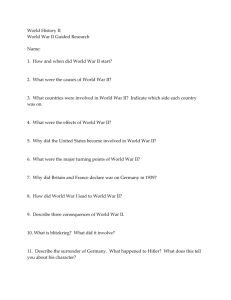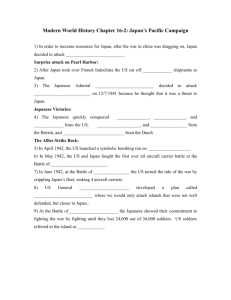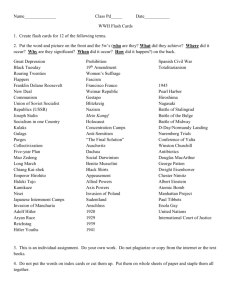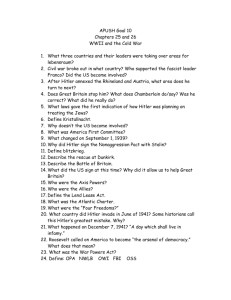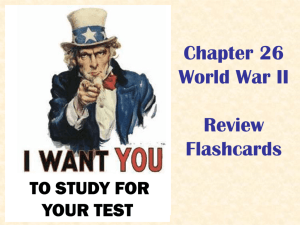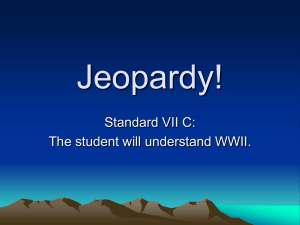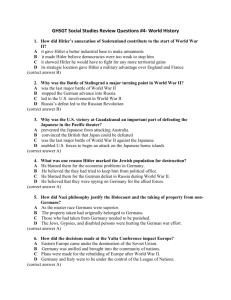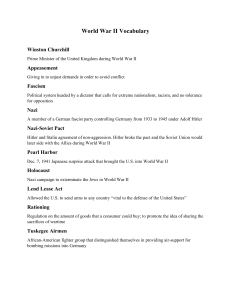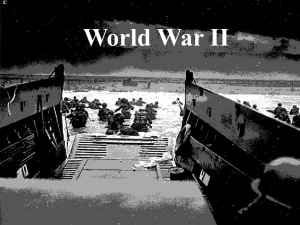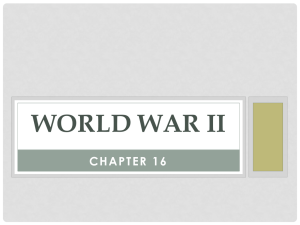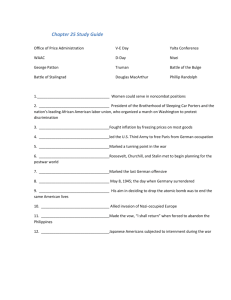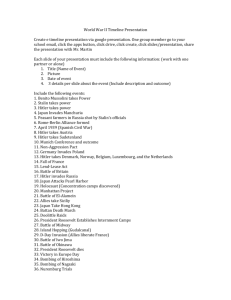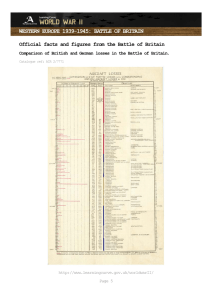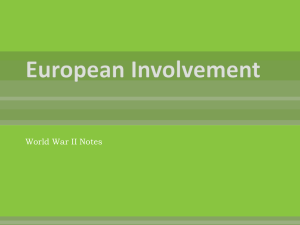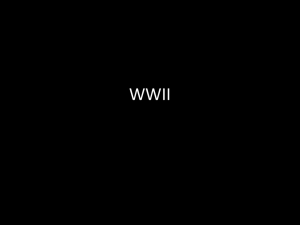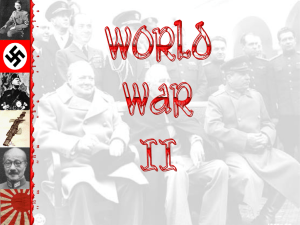U10 Vocabulary Chapter 29 Militarism Glorifying war and preparing
advertisement
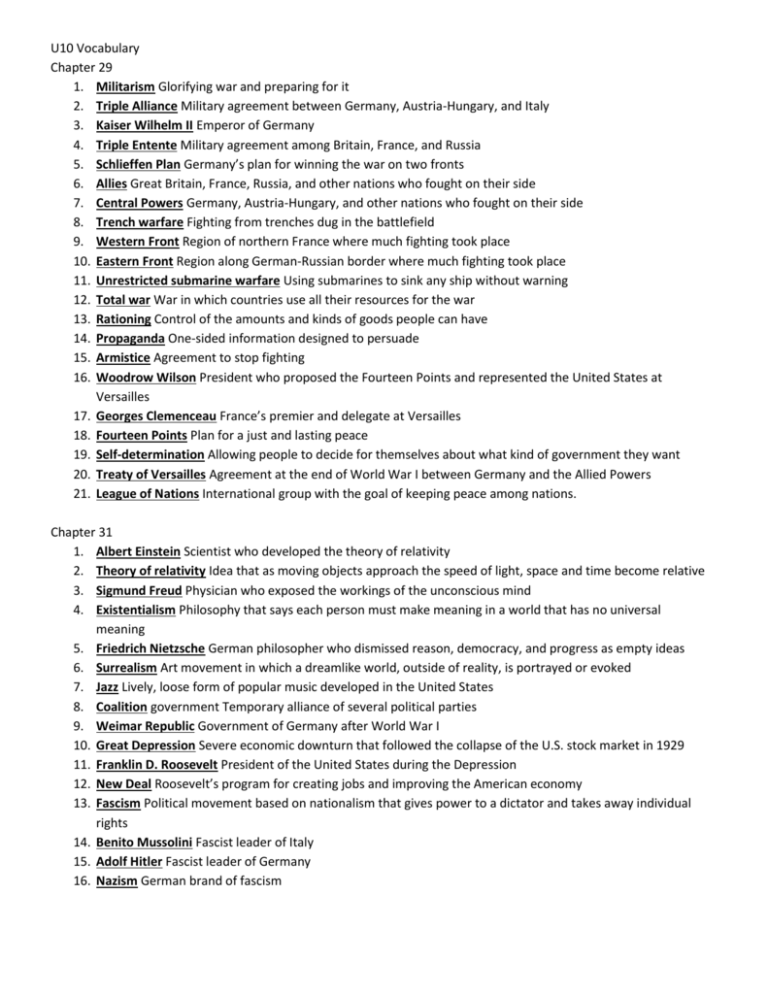
U10 Vocabulary Chapter 29 1. Militarism Glorifying war and preparing for it 2. Triple Alliance Military agreement between Germany, Austria-Hungary, and Italy 3. Kaiser Wilhelm II Emperor of Germany 4. Triple Entente Military agreement among Britain, France, and Russia 5. Schlieffen Plan Germany’s plan for winning the war on two fronts 6. Allies Great Britain, France, Russia, and other nations who fought on their side 7. Central Powers Germany, Austria-Hungary, and other nations who fought on their side 8. Trench warfare Fighting from trenches dug in the battlefield 9. Western Front Region of northern France where much fighting took place 10. Eastern Front Region along German-Russian border where much fighting took place 11. Unrestricted submarine warfare Using submarines to sink any ship without warning 12. Total war War in which countries use all their resources for the war 13. Rationing Control of the amounts and kinds of goods people can have 14. Propaganda One-sided information designed to persuade 15. Armistice Agreement to stop fighting 16. Woodrow Wilson President who proposed the Fourteen Points and represented the United States at Versailles 17. Georges Clemenceau France’s premier and delegate at Versailles 18. Fourteen Points Plan for a just and lasting peace 19. Self-determination Allowing people to decide for themselves about what kind of government they want 20. Treaty of Versailles Agreement at the end of World War I between Germany and the Allied Powers 21. League of Nations International group with the goal of keeping peace among nations. Chapter 31 1. Albert Einstein Scientist who developed the theory of relativity 2. Theory of relativity Idea that as moving objects approach the speed of light, space and time become relative 3. Sigmund Freud Physician who exposed the workings of the unconscious mind 4. Existentialism Philosophy that says each person must make meaning in a world that has no universal meaning 5. Friedrich Nietzsche German philosopher who dismissed reason, democracy, and progress as empty ideas 6. Surrealism Art movement in which a dreamlike world, outside of reality, is portrayed or evoked 7. Jazz Lively, loose form of popular music developed in the United States 8. Coalition government Temporary alliance of several political parties 9. Weimar Republic Government of Germany after World War I 10. Great Depression Severe economic downturn that followed the collapse of the U.S. stock market in 1929 11. Franklin D. Roosevelt President of the United States during the Depression 12. New Deal Roosevelt’s program for creating jobs and improving the American economy 13. Fascism Political movement based on nationalism that gives power to a dictator and takes away individual rights 14. Benito Mussolini Fascist leader of Italy 15. Adolf Hitler Fascist leader of Germany 16. Nazism German brand of fascism 17. 18. 19. 20. 21. 22. 23. 24. Mein Kampf Book by Hitler outlining his beliefs and goals for Germany Lebensraum Living space Appeasement Giving in to keep the peace Axis Powers Germany, Italy, and Japan Francisco Franco Spain’s Fascist dictator Isolationism Belief that political ties with other countries should be avoided Third Reich German empire Munich Conference Meeting of world powers in 1938 that allowed Hitler to take part of Czechoslovakia Chapter 32 1. Nonaggression pact Agreement that says countries will not attack or invade one another 2. Blitzkrieg Warfare in which surprise air attacks are followed by massive attacks on land 3. Charles de Gaulle Leader of the French government-in-exile 4. Winston Churchill Leader of Britain 5. Battle of Britain Battle of British and German air forces fought over Britain during 1940–1941 6. Erwin Rommel German general who led troops in North Africa 7. Atlantic Charter Declaration of principles issued by Winston Churchill and Franklin D. Roosevelt in August 1941 8. Isoroku Yamamoto Japanese admiral who decided that the U.S. fleet in Hawaii had to be destroyed 9. Pearl Harbor Navy base in Hawaii attacked by the Japanese 10. Battle of Midway Sea and air battle in which American forces defeated Japanese forces near Midway Island in the Pacific 11. Douglas MacArthur U.S. general who commanded Allied forces in the Pacific 12. Battle of Guadalcanal Six-month battle on the island of Guadalcanal in which American and Australian troops defeated Japanese defenders 13. Holocaust Systematic mass killing of Jews and other groups considered inferior by Nazis 14. Kristallnacht “Night of Broken Glass,” when Nazis attacked Jews throughout Germany 15. Ghettos Neighborhoods in which European Jews were forced to live 16. ”Final Solution“ Hitler’s plan to kill as many Jews as possible 17. Genocide Systematic killing of an entire people 18. Dwight D. Eisenhower American general who helped drive the Germans out of Africa 19. Battle of Stalingrad Battle during which the Red Army forced the Germans out of Stalingrad 20. D-Day Huge Allied invasion mounted to retake France from the Germans 21. Battle of the Bulge Final large-scale attack by German troops that was forced back by the Allies 22. Kamikaze Japanese suicide pilots 23. Nuremberg Trials Trials of Nazi leaders charged with crimes against humanity, held in Nuremberg, Germany 24. Demilitarization Breaking down armed forces 25. Democratization Process of creating a government elected by the people
